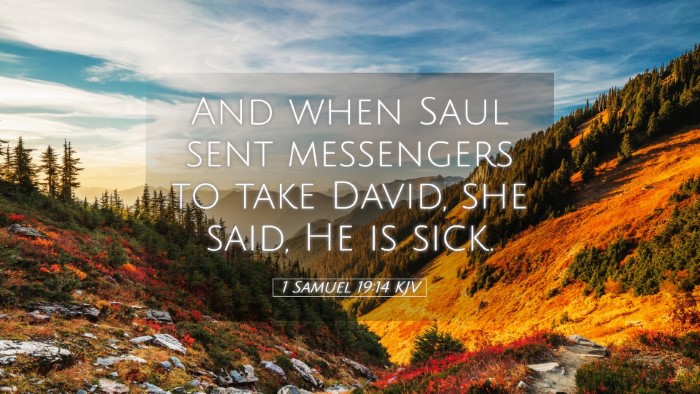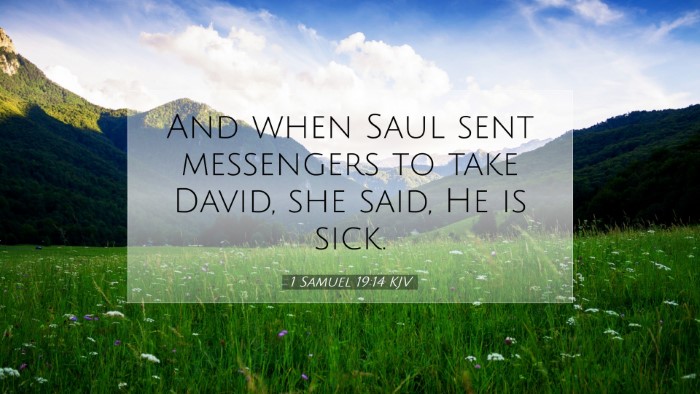Commentary on 1 Samuel 19:14
Verse Reference: 1 Samuel 19:14 - "And when Saul sent messengers to take David, she said, He is sick."
Introduction
This verse occurs in a critical juncture in the narrative of 1 Samuel, illustrating the escalating conflict between Saul and David. It reveals the complexities of human relationships and the courage of those who protect the innocent. The actions of Michal, David's wife, provide a profound example of loyalty and subterfuge in the face of tyranny.
Contextual Background
Historical Setting: At this time, Saul, Israel's first king, has become increasingly paranoid and jealous of David, who has been rising in popularity and success, particularly after defeating Goliath. Saul's increasingly erratic behavior becomes a significant theme in the unfolding narrative.
The Role of Michal: Michal, Saul's daughter, who is married to David, is caught between her loyalty to her father and her love for David. Her actions in this verse illustrate the moral dilemmas faced by individuals in positions where familial loyalties conflict with divine purpose.
Commentary Insights
Matthew Henry:
Henry emphasizes the providence of God in protecting David through Michal's quick thinking. He notes that Michal's statement about David being sick can be seen not just as a lie, but as a strategic move to delay and mislead Saul's messengers, thus buying David time. Henry reflects on how this illustrates the broader theme of God using unexpected means and individuals to fulfil His purposes.
Albert Barnes:
Barnes points out that Michal's deception showcases her loyalty. He explains the significance of her words "He is sick," interpreting them as a bold act of defiance against a king who represents a tyrannical regime. Barnes highlights the tension in Michal’s life, caught in a web of conflicting loyalties, yet choosing to protect her husband. This act not only preserves David's life but also affirms the notion that faithfulness can sometimes necessitate difficult decisions.
Adam Clarke:
Clarke discusses the deeper implications of Michal's statement, suggesting that in saying David was sick, she metaphorically acknowledged the spiritual sickness of Saul. This statement, while a cover for David's absence, also reflects the moral decay of Saul's kingdom under his rulership. Clarke emphasizes the moral intricacies involved, where Michal serves as a key figure representing divine protection over David while confronting the wickedness of Saul.
Theological Implications
Divine Providence: The verse illustrates God's providential care for David amidst human opposition. God's plans often operate through human actions, and this story exemplifies how He uses the brave actions of Michal to safeguard David, highlighting that God's support is often revealed through unexpected means.
Courage in Adversity: Michal demonstrates immense courage, showcasing that standing up for righteousness often requires risk. Her willingness to lie to protect her husband speaks volumes about her character and the ethical dilemmas faced by those who seek to honor God amidst familial and societal pressures.
Conflict of Loyalties: The tension between loyalty to family and loyalty to God's anointed king is a central theme here. Michal’s actions resonate with believers who find themselves in situations of divided loyalties, prompting reflection on how one responds when allegiance to family conflicts with allegiance to divine purpose.
Practical Applications
- Protecting the Innocent: In today's world, believers are called to protect the innocent, standing against injustice and oppression, following Michal's example.
- Courageous Faith: Like Michal, Christians are encouraged to act with courage and integrity, often in the face of personal risk or societal pressure.
- Understanding Divine Use: Believers should be aware of how God might use them as instruments for His purpose, even in perilous situations. Michal’s story challenges us to remain faithful to God’s calling, regardless of the consequences.
Conclusion
1 Samuel 19:14 serves as a powerful reminder of the complexities of divine providence and human action. The courage displayed by Michal highlights the importance of steadfastness in faith and the challenges that come with loyalty. As pastors, students, and theologians delve into this narrative, they are encouraged to consider how modern believers might navigate similar conflicts of loyalty, reflecting on how God is present in the midst of challenges, leading His people to implement His will.


